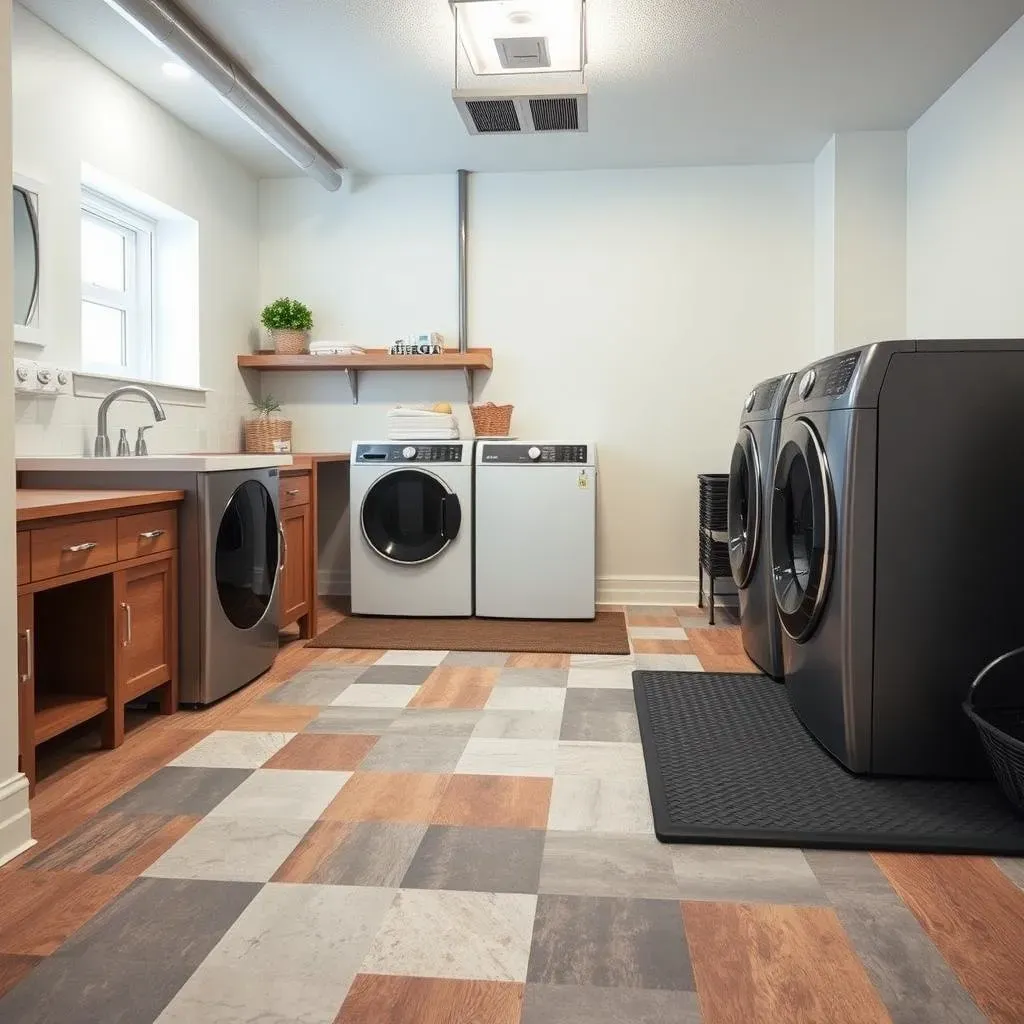Table of Contents
Is your basement laundry room floor a drab, cold concrete slab? Thinking about upgrading it but feeling lost in a sea of options? You're not alone! Basement laundry rooms can be tricky spaces. They're prone to dampness, spills, and let's face it, sometimes they just feel a bit…basement-y. But don't worry, finding the perfect **basement laundry room flooring ideas** doesn't have to be a chore. This article is your guide to navigating the world of laundry room floors. We'll explore the best, most practical, and even stylish choices that can handle moisture, survive accidental detergent explosions, and still look great. From budget-friendly vinyl to durable tile and even comfy rubber, we'll break down the pros and cons, helping you pick the perfect foundation for your laundry space. Get ready to step up your laundry game, starting from the ground up!
Top Basement Laundry Room Flooring Ideas: Waterproof & Stylish Choices
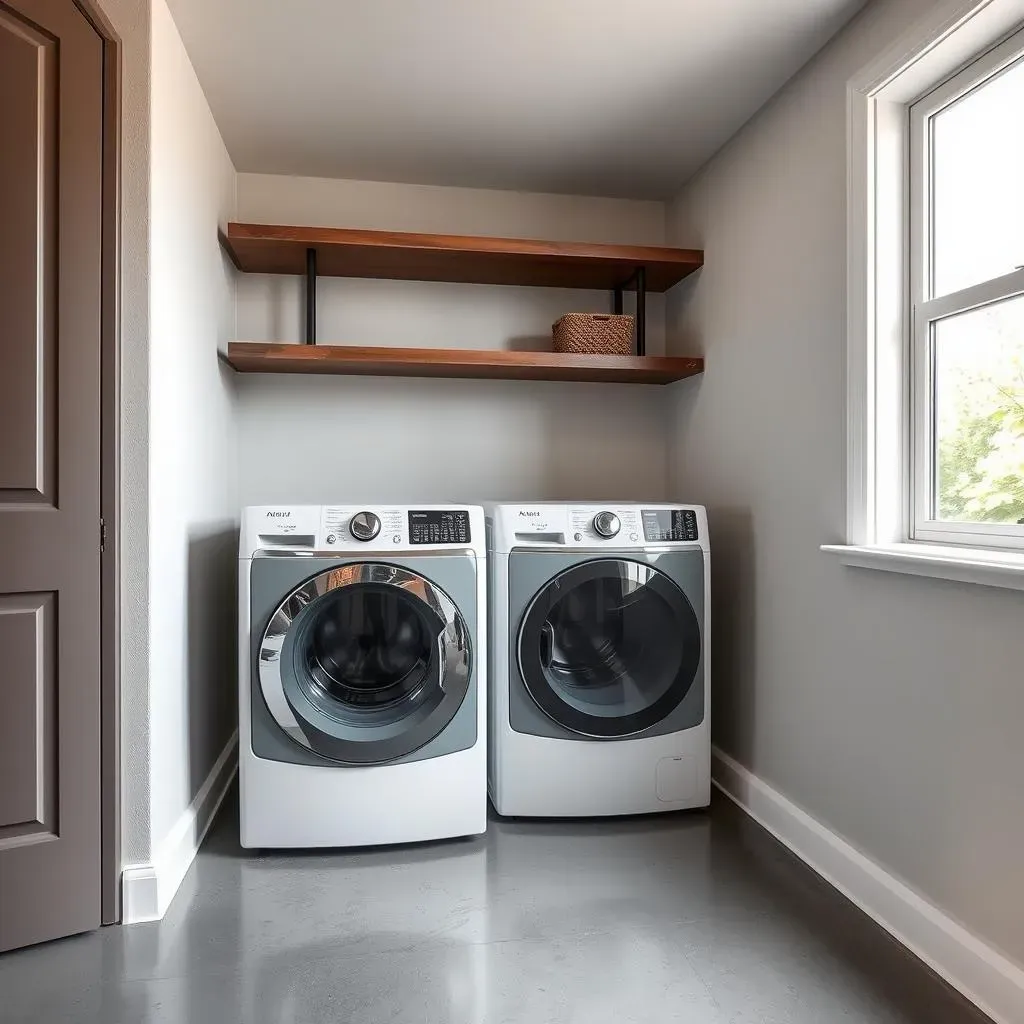
Top Basement Laundry Room Flooring Ideas: Waterproof & Stylish Choices
Let's be real, basement laundry rooms often feel like the forgotten stepchild of home design. They're usually utilitarian spaces, cold, and kinda damp – not exactly inspiring. But it doesn't have to be that way! When it comes to **top basement laundry room flooring ideas**, you absolutely can have both function and style. Forget about that cracked, boring concrete. Think about floors that can handle a rogue washing machine leak, look fantastic, and maybe even make you enjoy laundry day (okay, maybe not enjoy, but tolerate it more!). We're talking about flooring that’s tough enough for the basement environment but still stylish enough to boost your home's overall vibe. Let’s dive into some winning options that check both boxes – waterproof and wow-factor.
Choosing the Right Basement Laundry Room Flooring: Durability & Moisture Resistance
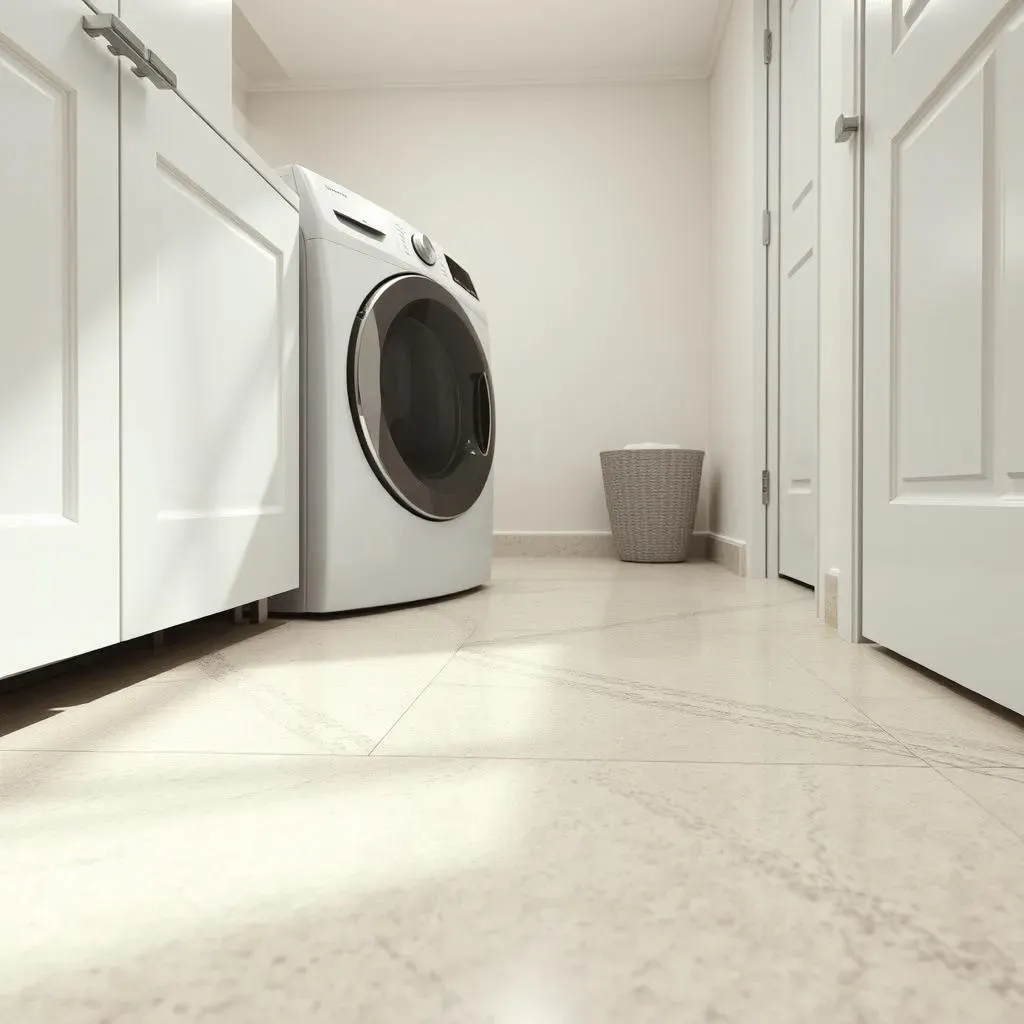
Choosing the Right Basement Laundry Room Flooring: Durability & Moisture Resistance
Why Toughness and Water-Proofing Matter
so why are we even talking about durability and moisture for a laundry room floor? Basements, especially, can be like the Wild West of your house. They can get damp, sometimes REALLY damp. Think about it: washing machines can leak, pipes can drip, and basements are just naturally closer to the ground, which means more moisture. Imagine spending all weekend cleaning up a flooded laundry room because your floor couldn't handle a little spilled water. Not fun, right? I remember once my washing machine decided to have a party and overflowed – my old carpet was soaked for days! Lesson learned: for a basement laundry room, you need a floor that's as tough as nails and laughs in the face of water.
Key Features for a Basement Laundry Room Floor
So, what exactly makes a floor "tough" and "water-resistant"? It's not just about looking pretty (though that's a bonus!). You need to think about a few key things. First, **waterproof is king**. You want flooring that water can’t soak into, causing mold, mildew, or warping. Second, **durability is crucial**. Laundry rooms see a lot of foot traffic, heavy machines, and dropped detergent bottles. You need a floor that can handle the wear and tear without getting scratched or dented easily. Lastly, think about **easy cleaning**. Spills happen, dust bunnies gather – you want a floor that's simple to wipe down and keep looking decent without too much effort. Nobody wants to spend more time cleaning the laundry room than doing laundry, right?
Feature | Why it Matters |
|---|---|
Waterproof | Prevents water damage, mold, and mildew in damp basements. |
Durable | Withstands heavy appliances, foot traffic, and potential spills. |
Easy to Clean | Simplifies maintenance and keeps the laundry room hygienic. |
Flooring Types That Rise to the Challenge
Alright, now that we know what we're looking for, what kind of flooring actually fits the bill? Good news! There are several options that are perfect for basement laundry rooms because they are built to be tough and handle moisture. We're talking about materials like vinyl, tile (both ceramic and porcelain), and even rubber. These aren’t just practical choices; they come in tons of styles these days, so you can actually find something that looks good too. In the next section, we'll get into the nitty-gritty of each of these flooring types, comparing their pros and cons, and helping you figure out which one is the best match for your basement laundry space. Spoiler alert: carpet and wood are probably not making the cut here!
Basement Laundry Room Flooring Options: Vinyl, Tile, and Rubber Compared
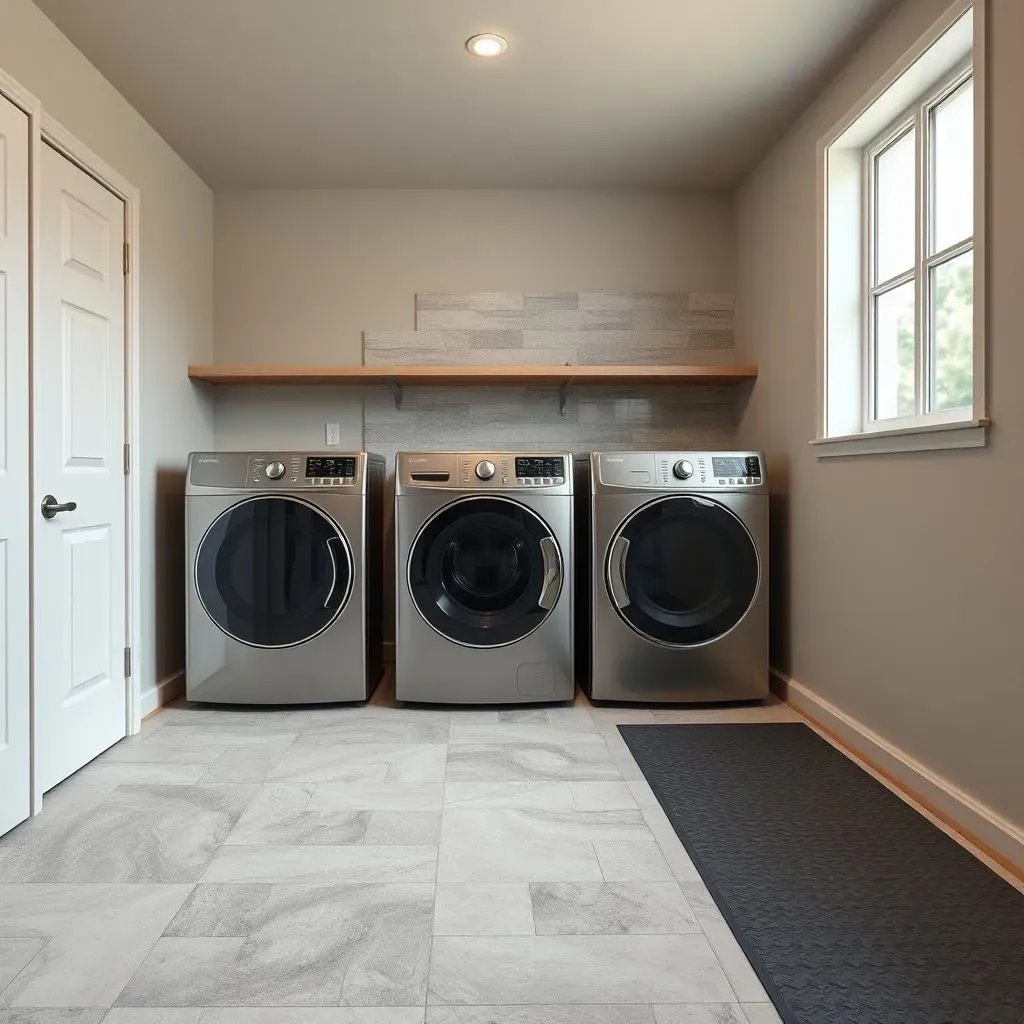
Basement Laundry Room Flooring Options: Vinyl, Tile, and Rubber Compared
Vinyl Flooring: The Budget-Friendly Champ
Let's kick things off with vinyl flooring, often the unsung hero of basement renovations. Vinyl is like the chameleon of flooring – it comes in sheets, tiles, and planks, mimicking the look of wood, stone, or tile, but for way less cash. For a basement laundry room, sheet vinyl is a superstar because it's basically one big, seamless piece. Fewer seams mean fewer places for water to sneak in, making it super waterproof. Plus, it's comfy underfoot compared to cold, hard concrete, and pretty easy to clean up spills. Think of it as the practical, no-fuss option that gets the job done without emptying your wallet. Just don't expect it to feel super luxurious – it's more about function than fancy.
Tile Flooring: Durable and Water-Resistant All-Stars
Next up, we have tile – ceramic and porcelain, to be specific. These guys are the heavy hitters in the flooring world when it comes to durability and water resistance. Tile is basically waterproof – water just sits on top, waiting to be wiped up. Try staining tile – good luck! It's also incredibly tough, standing up to heavy washing machines and clumsy feet without scratching or denting easily. Plus, tile comes in a massive range of styles, from super sleek modern looks to rustic, textured vibes. You can really get creative and make your laundry room look amazing. The downside? Tile can be cold underfoot in a basement, and it's harder to install yourself than vinyl. Also, if you drop a glass detergent bottle, the tile will probably win, but the bottle definitely won't.
Rubber Flooring: The Unexpectedly Awesome Choice
Rubber flooring? Yeah, I know, it might sound a little weird for a laundry room, maybe you're picturing a gym floor. But hear me out! Rubber is actually a fantastic option, especially in a basement. It's naturally water-resistant, super durable (it's made for gyms, remember?), and it's got a bit of give, making it comfortable to stand on while you're folding mountains of clothes. Plus, it's slip-resistant, which is a big bonus in a room where spills are likely. Rubber flooring often comes in rolls or interlocking tiles, making it relatively easy to install. And while it might not have the same high-end look as tile, it comes in different colors and textures these days, so you can find something that’s not just black gym matting. It’s the underdog that might just surprise you with its practicality and comfort.
Flooring Type | Waterproofness | Durability | Comfort | Cost |
|---|---|---|---|---|
Vinyl | Excellent (Sheet Vinyl) | Good to Very Good | Good | Budget-Friendly |
Tile (Ceramic/Porcelain) | Excellent | Excellent | Fair (Can be cold) | Mid-Range to High |
Rubber | Excellent | Excellent | Very Good | Mid-Range |
Flooring to Avoid in Basement Laundry Rooms: Expert Tips & Cost Considerations
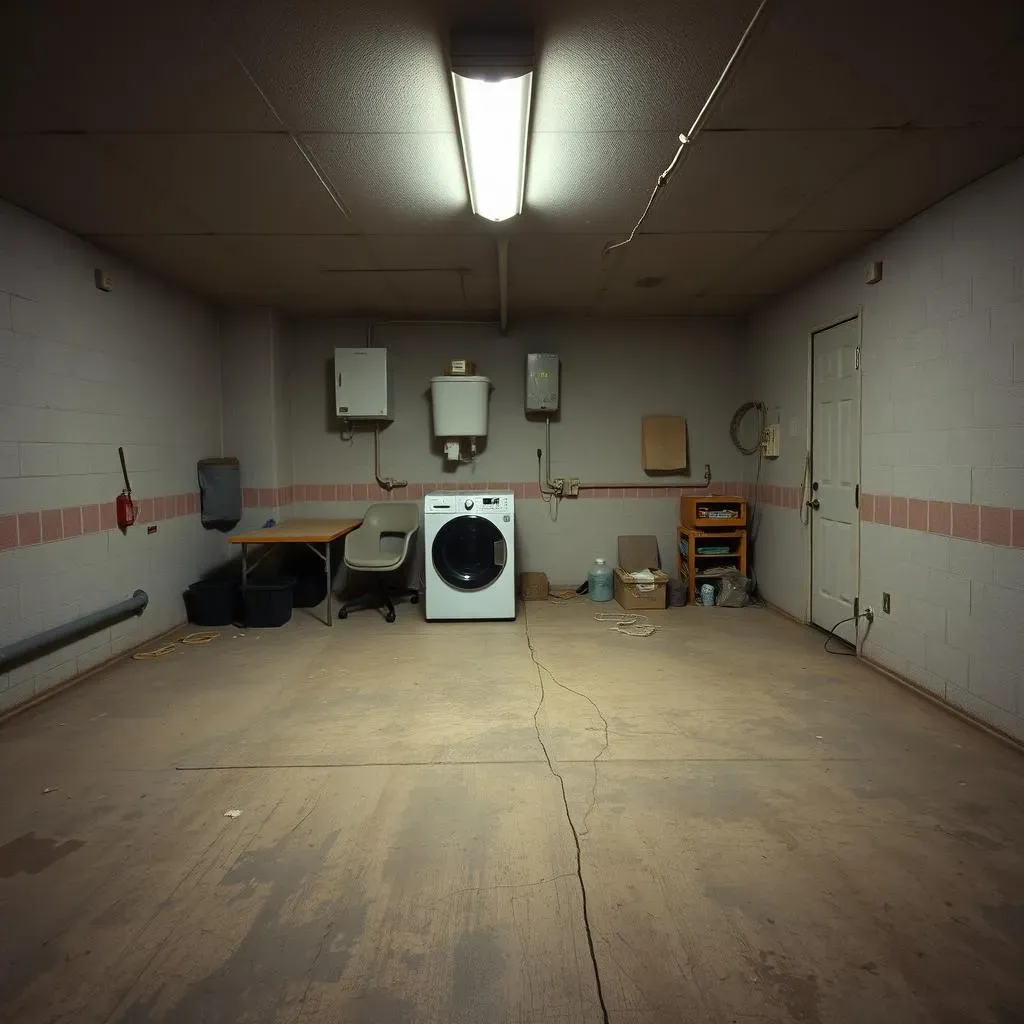
Flooring to Avoid in Basement Laundry Rooms: Expert Tips & Cost Considerations
so we've talked about the rockstars of basement laundry room flooring. Now, let’s shine a light on the hall of shame – the flooring options you should probably run screaming from when it comes to your basement laundry space. Trust me, choosing the wrong floor here is like wearing socks with sandals – just a bad idea that you'll regret later. We're talking about materials that might look nice in other rooms but are basically asking for trouble in a damp basement with a washing machine that occasionally acts like a toddler throwing a tantrum. Let’s save you from potential flooring disasters and wallet-emptying mistakes, shall we?
Carpet: A Mold Magnet
First up, carpet. Oh, carpet. It's cozy, it's soft, it's… a sponge in a basement laundry room. Seriously, carpet and basements are like oil and water – they just don't mix. Basements are already prone to moisture, and carpet traps it like a dream. Hello mold, hello mildew, hello stinky smells! Even if you're super careful, spills happen in laundry rooms – detergent, bleach, water – and carpet soaks it all up. Then you're left with a damp, potentially moldy floor that's a pain to clean and can become a health hazard. Plus, think about trying to lug a heavy washing machine across carpet. Nightmare fuel.
Wood (and Laminate): Warping Wonders
Next on the "no-no" list: wood and laminate flooring. Yes, hardwood floors are gorgeous, and laminate can mimic the look for less. But basements are their kryptonite. Wood and laminate are organic materials, meaning they react to moisture. Basement + moisture = warping, buckling, and swelling. Imagine your beautiful wood floor turning into a wavy funhouse mirror after a minor leak. Not so fun, right? Laminate is a bit more resistant than solid wood, but it's still not waterproof. Once water seeps into those seams, it's game over. Replacement time, and that's definitely not budget-friendly.
Flooring Type | Why to Avoid | Expert Tip |
|---|---|---|
Carpet | Traps moisture, promotes mold & mildew, hard to clean. | Steer clear completely. Not suitable for basements at all. |
Wood (Solid & Laminate) | Warps and swells with moisture, prone to water damage. | Best for above-ground, dry areas. Basements are too risky. |
Cork and Marble: Looks Can Be Deceiving
Cork flooring might seem like a comfy, eco-friendly option, and marble screams luxury. But both have major drawbacks in a basement laundry room. Cork, while somewhat water-resistant, is porous. Spills need to be cleaned up immediately, and it's not ideal for consistently damp environments. Plus, it can dent easily, and laundry rooms see a lot of heavy stuff. Marble, on the other hand, is porous and expensive! Stains easily, and while sealing can help, it's still not the best choice for a room where spills are common. And let's be honest, who wants to worry about babying their laundry room floor? You want something practical, not precious.
The Real Cost of Choosing Wrong
So, what's the bottom line here? Choosing the wrong flooring for your basement laundry room isn't just about aesthetics; it's about avoiding headaches and saving money in the long run. Water damage from unsuitable flooring can lead to costly repairs, mold remediation, and premature floor replacement. Think about the cost of ripping out warped wood or moldy carpet, plus the cost of installing a new, *correct* floor. Suddenly, that slightly more expensive vinyl or tile option starts looking like a bargain, doesn't it? Investing in the right waterproof and durable flooring upfront is the smart move that will save you money, time, and a whole lot of frustration down the road. Trust the experts (and my slightly snarky advice), and choose wisely!
Conclusion: Step Up Your Basement Laundry Room with the Right Flooring
Choosing the right flooring for your basement laundry room is more than just picking a pretty color. It's about creating a space that's functional, durable, and can withstand the unique challenges of a basement environment. From waterproof vinyl that mimics wood or tile, to the robust nature of ceramic and porcelain, and even the surprisingly practical rubber, you have great options to transform your laundry space. Forget about damp, dreary basement floors. With the right flooring, your basement laundry room can become a brighter, more pleasant, and definitely drier part of your home. So go ahead, take the plunge and upgrade your floor – your feet (and your laundry routine) will thank you!
